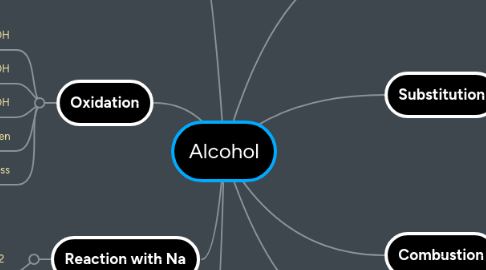
1. Iodoform test
1.1. Alcohol + aq. alkaline I2 forms salt + CHI3
1.1.1. Warm
1.1.1.1. C2H5OH + I2 + OH- forms CHI3 +I- +H2O + CHOO-
1.1.1.2. C2H5OH + I2 + NaOH forms CHI3 +I- +H2O + CHOO-Na+
1.2. Yellow crystals formed and tested positive with iodoform test
1.2.1. Ethanal
1.2.2. Ethanol
1.2.3. Methylketone
1.2.4. Alcohol with formula CH3CH(OH)-
2. Oxidation
2.1. 1°OH
2.1.1. Forms aldehyde (CHO) if distil
2.1.1.1. Acidified K2Cr2O7 / KMnO4
2.2. 1°OH
2.2.1. Forms carboxylic acid (COOH) if reflux
2.2.1.1. Acidified K2Cr2O7 / KMnO4
2.3. 2°OH
2.3.1. Forms ketone (CHO) if reflux
2.3.1.1. Acidified K2Cr2O7 / KMnO4
2.4. K2Cr2O7 changes from orange to green
2.5. KMnO4 changes from purple to colourless
3. Reaction with Na
3.1. Alcohol + Na forms Sodium salt + H2
3.1.1. Example sodium ethoxide (O-NA+)
3.1.2. Turns phenophthalein from colourless to pink
3.1.3. Sodium sinks and H2 gas evolved
4. Formation of ester
4.1. Conc.H2PO4 + reflux
4.1.1. COOH + OH
4.1.2. COCl + OH
5. Acylation
5.1. COCl + OH forms ester + HCl
5.1.1. RTP
6. Substitution
6.1. Reagents + conditions
6.1.1. PCl3 + heat
6.1.1.1. C2H5OH + PCl3 forms C2H5Cl + H3PO3
6.1.2. PCl5 + rtp
6.1.2.1. ROH + PCl5 forms C2H5Cl + POCl3 + HCl
6.1.3. SOCl2 + rtp
6.1.3.1. ROH + SOCl2 forms RCl + SO2 + HCl
6.1.4. HX + heat
6.1.4.1. NaBr + H2SO4 forms HBr + NaSO4
6.1.4.2. HBr + C2H5OH forms C2H5Br + H2O
6.1.4.2.1. Cl or Br reacts with Conc. H2SO4
6.1.4.2.2. I reacts with H3PO4
7. Combustion
7.1. Alcohol + O2 forms CO2 + H2O
7.1.1. Heat required
8. Dehydration
8.1. Conc. H2SO4, 170°C
8.1.1. Forms alkene + H2O
8.2. Heated AL2O3
8.2.1. Forms alkene
